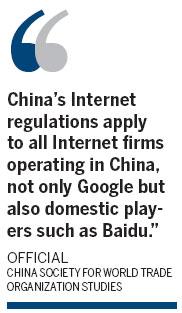BEIJING - Chinese trade experts said on Tuesday that Google's move to describe China's Internet restrictions as an unfair barrier to free trade is groundless, as the country's Internet regulations apply to everyone and are in accordance with the rules of the World Trade Organization.

They said that multinational companies should respect local laws and regulations if they want to do business in China.
"It is understandable that different countries have various laws and regulations with regard to the Internet," said Wang Lequan, director of the research center on transnational corporations at the Ministry of Commerce.
"As long as these regulations fulfill China's commitment to the World Trade Organization, multinationals should respect that."
Google Inc said last week that the search engine is asking the United States and governments in Europe to press China to lift Internet restrictions, claiming that they are an unfair barrier to free trade.
Google's top lawyer David Drummond said the restricted search results limit Google's ability to enjoy fair trade and put local competitors, such as the Baidu search engine, at a commercial advantage.
"China's Internet regulations apply to all Internet firms operating in China, not only Google but also domestic players such as Baidu," an official from China Society for World Trade Organization Studies told China Daily.
"In fact, Google's market share in China surged significantly since it entered China," said the official, who declined to be named.
According to Analysys International, Google's market share in China increased from 22.8 percent in 2006 to 35.6 percent in the fourth quarter of last year, while Baidu's share declined from nearly 70 percent to 58 percent.
The company announced in January that it was no longer willing to provide restricted results in its Chinese-version website Google.cn and moved its domestic site in March to Hong Kong, which does not have similar restrictions.
Google's market share in China fell to 30.9 percent in the first quarter, as advertisers reduced their expenditure on the search engine, Analysys International said. Baidu's market share rose to 64 percent from 58.4 percent in the period.
Chinese law prohibits the spread of "content subverting State power, undermining national unity, infringing upon national honor and interests, inciting ethnic hatred and secession" as well as pornography and terrorism, according to China's first White Paper on the Internet released last week by the State Council.
It also touches for the first time on the idea of "Internet sovereignty", to explain the government's requirement that foreign IT companies operating in the country have to abide by Chinese law.
"I think Google's retreat from the mainland is not a professional business decision," said Christopher Liu, a consultant based in Beijing.
He said that multinationals should respect domestic circumstances if they want to do business in certain countries.
Wang from the ministry's research center said that it often takes time for China to make some major reforms. "I think multinationals should have more patience," he said.





